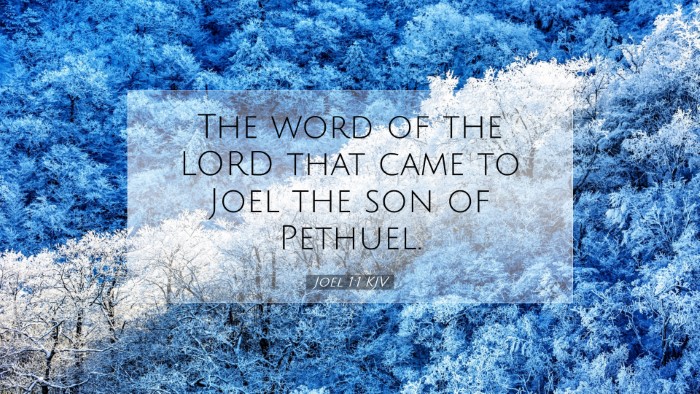Old Testament
Genesis Exodus Leviticus Numbers Deuteronomy Joshua Judges Ruth 1 Samuel 2 Samuel 1 Kings 2 Kings 1 Chronicles 2 Chronicles Ezra Nehemiah Esther Job Psalms Proverbs Ecclesiastes Song of Solomon Isaiah Jeremiah Lamentations Ezekiel Daniel Hosea Joel Amos Obadiah Jonah Micah Nahum Habakkuk Zephaniah Haggai Zechariah MalachiJoel 1:1
Joel 1:1 KJV
The word of the LORD that came to Joel the son of Pethuel.
Joel 1:1 Bible Commentary
Commentary on Joel 1:1
The book of Joel opens with a succinct introduction, identifying the prophet and the circumstances surrounding his message. In Joel 1:1, we see the verse states:
"The word of the LORD that came to Joel the son of Pethuel."
Contextual Introduction
This opening verse serves not only as an introductory phrase but also as a critical marker for understanding the prophecy that follows. Joel, whose name means 'Yahweh is God', is believed to have prophesied during a time of national calamity, possibly in the aftermath of a locust plague that devastated the land and led to an agricultural crisis.
Insights from Public Domain Commentaries
Matthew Henry's Commentary
According to Matthew Henry, the importance of this verse lies in its emphasis on divine revelation. The phrase "the word of the LORD" indicates that the message Joel brings is not of human origin but divinely inspired. This sets a tone of authority for the subsequent messages in the book. Henry suggests that the calling of the prophet is crucial for the people’s understanding of their situation. The inclusion of Joel's ancestry—being the son of Pethuel—indicates his background, which may have lent credibility to his message, particularly in a time that called for a return to righteousness.
Albert Barnes' Commentary
Albert Barnes elaborates on the urgency implied in this declaration. He notes that the use of 'the word of the LORD' emphasizes the seriousness of the warnings and teachings that follow in the chapter. Barnes discusses how the locust plague described shortly after in the text serves as a metaphor for the impending judgement if the people do not repent. By identifying himself as the son of Pethuel, Joel connects with his Jewish heritage, establishing an important link to his audience. This was vital for their acceptance of his prophetic role.
Adam Clarke's Commentary
Adam Clarke provides a more historical perspective, questioning the exact timeframe of Joel’s ministry. He suggests that while there is debate regarding when Joel prophesied—some place him in the pre-exilic period while others argue for the post-exilic context—what shines through is the timeless nature of his message. Clarke asserts that Joel’s writings reflect a prescient awareness of both immediate and far-reaching consequences of moral decay and unfaithfulness to God.
Thematic Relevance
This opening verse, while brief, sets up the major themes of the entire book of Joel, which include:
- Divine Judgment: A proclamation that God’s judgment is not only imminent but also serves as a call to repentance.
- Call to Repentance: Joel emphasizes the need for a collective cry to God for mercy in the face of calamity.
- The Day of the LORD: A recurring theme throughout the book that highlights both judgment and the promise of restoration.
Application for Today
The message found in Joel 1:1 is not merely a historical account; it serves today's church and believers in several ways:
- Recognition of Authority: Understanding that the Word of God carries weight, and His prophets are His appointed voices.
- Mindful of God’s Sovereignty: A reminder to see God’s hand in both blessing and calamity, calling for a response that honors Him.
- Emphasis on Repentance: The need for continuous self-examination and humility before God.
Conclusion
Joel 1:1 serves as a brief yet powerful introduction to the themes of prophecy, judgment, and restoration. As we explore the rest of the text, the urgent call for repentance amidst calamity resonates deeply, reminding us that the sociopolitical and spiritual crises of our time cannot be adequately addressed without first acknowledging the source of revelation and taking a stand for righteousness as articulated by God’s chosen messengers.


